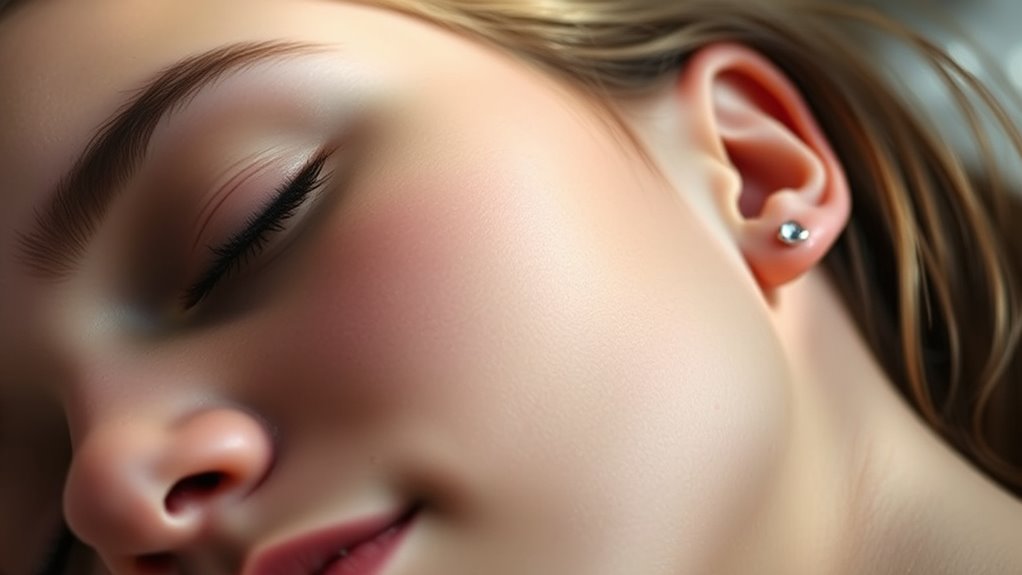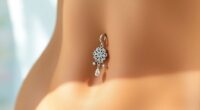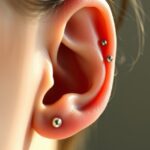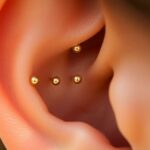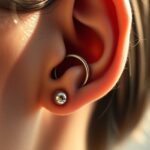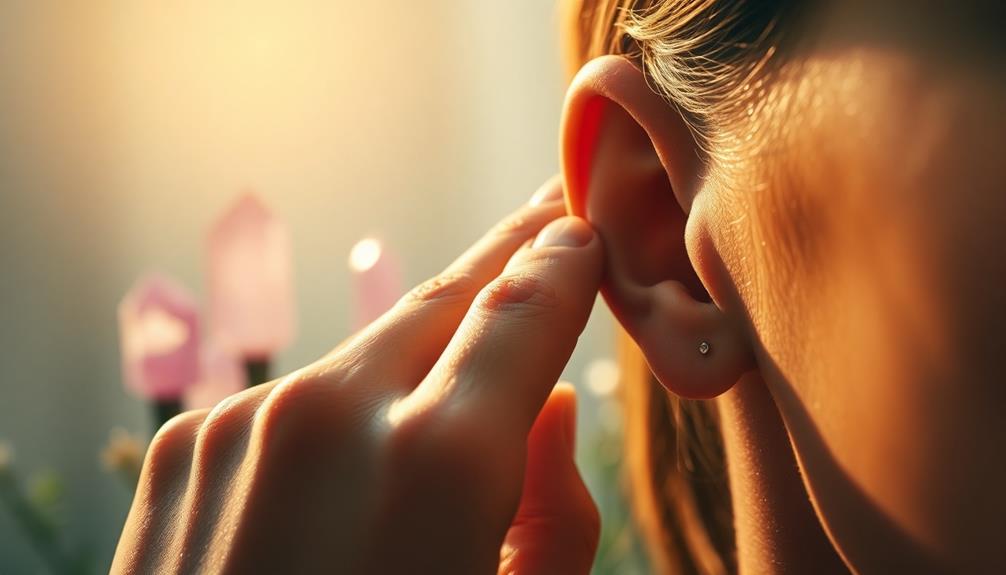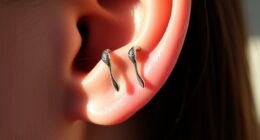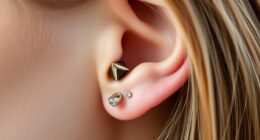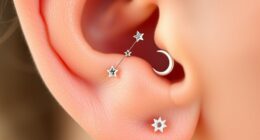Some claim that piercings on specific ear points can influence anxiety levels by stimulating nerve pathways linked to relaxation. However, scientific evidence supporting this is limited and mostly anecdotal. While some believe that piercing certain points may help trigger calming responses, these effects are not proven or consistent. The sensations from piercing are mainly physical and temporary, and any calming effect may be due to psychological factors. To find out more about how ear piercings might affect anxiety, continue exploring this topic.
Key Takeaways
- Limited scientific evidence supports that ear piercings directly influence anxiety levels through acupressure points.
- Piercing sensations are mainly due to nerve stimulation and tissue trauma, not intentional acupressure.
- Any calming effects from piercings are likely psychological, stemming from distraction or novelty.
- Traditional ear acupressure aims to alleviate anxiety, but piercings are incidental and not a controlled method.
- Piercings should not replace evidence-based treatments for anxiety, as their impact is temporary and individual-specific.
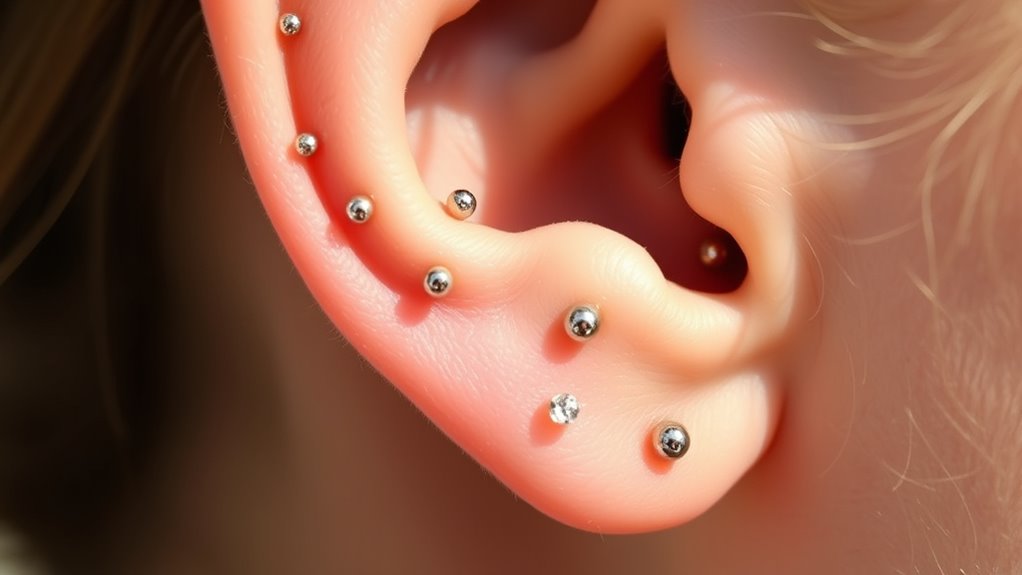
Have you ever wondered if acupressure can truly deliver on its health claims? Many people turn to alternative therapies like ear acupressure, hoping to find relief from anxiety and stress. This technique involves applying pressure to specific points on the ear, which are believed to correspond to different parts of the body and mind. Some practitioners suggest that stimulating these points can help balance energy flow and reduce anxiety. But what about the idea that piercing sensations from ear piercings might influence your anxiety levels? While it sounds intriguing, the connection isn’t straightforward.
When you get your ears pierced, you experience piercing sensations—sharp, sometimes throbbing, sensations that are often followed by swelling or tenderness. These sensations are a direct result of nerve stimulation and tissue trauma. Some alternative health advocates claim that these sensations may activate nerve pathways that influence emotional states, including anxiety. The idea is that, by piercing certain points on the ear, you might trigger a calming response similar to ear acupressure. However, scientific evidence supporting this is limited. Most of what exists is anecdotal, with individuals reporting feeling calmer after an ear piercing, but without definitive proof that the sensations or the piercing itself cause anxiety relief.
In traditional Chinese medicine, specific points on the ear are linked to mental health and emotional well-being. Acupressure works by applying pressure to these points, which is thought to stimulate the nervous system and promote relaxation. When you get an ear piercing, the piercing sensations could inadvertently stimulate some of these same points, but this isn’t a targeted or controlled process like acupressure. Instead, it’s an incidental effect, and its impact on anxiety varies from person to person. Some may find that the discomfort or the act of piercing distracts them from stress, leading to a temporary feeling of relief. Others might experience increased anxiety due to pain or discomfort.
It’s important to recognize that the calming effects some attribute to ear piercings are likely more psychological than physiological. The anticipation, the novelty, or the social aspect of getting pierced can influence your mood. While ear acupressure is a deliberate practice aimed at health benefits, piercing sensations are often incidental, and their influence on anxiety isn’t well-established scientifically. If you’re considering ear acupressure or ear piercings as anxiety remedies, it’s wise to approach them with realistic expectations. They might help some people feel better temporarily, but they shouldn’t replace evidence-based treatments for anxiety. Additionally, understanding that cultural heritage plays a role in traditional healing practices can help contextualize these techniques and their perceived benefits.
Frequently Asked Questions
Can Acupuncture Piercings Help With Chronic Anxiety?
If you’re wondering whether acupuncture piercings can help with chronic anxiety, it’s possible they might influence your meridian points and improve energy flow. These piercings are believed to stimulate specific spots that balance your body’s energy, potentially reducing anxiety symptoms. While scientific evidence varies, many find that targeted piercings or acupressure techniques help promote relaxation and emotional well-being by enhancing the flow of energy through your meridian pathways.
Are There Specific Piercings Linked to Stress Reduction?
Imagine someone gets a piercing on the ear’s antihelix, inspired by traditional healing and cultural practices. This piercing is believed to stimulate pressure points that may help reduce stress and anxiety. While scientific evidence is limited, many believe such piercings can influence stress levels through these traditional healing methods. If you’re curious, consult a professional to explore how specific piercings linked to cultural practices might support your stress relief journey.
How Long Does It Take to Notice Anxiety Improvements From Piercings?
You might notice anxiety improvements within a few weeks after getting a piercing, but it varies based on individual healing and stress relief response. During piercing healing, your body adjusts, and some find that stress relief occurs as their body responds to the new sensation. Keep in mind, patience is key, and consistent self-care during healing can enhance the stress-relieving effects you seek from specific piercings.
Are Piercing-Induced Acupressure Techniques Scientifically Proven?
Did you know that about 30% of alternative therapy claims are actually placebo effects? When it comes to piercing-induced acupressure techniques, scientific proof is limited. While some believe piercings can influence anxiety, current studies don’t robustly support this. You should approach these methods cautiously, understanding they might work through placebo effects rather than proven physiological mechanisms. Always consult healthcare professionals before relying on piercing as an anxiety treatment.
What Are the Risks of Using Piercings for Anxiety Relief?
Using piercings for anxiety relief carries risks you should consider. You might experience piercing infections, which can cause pain and require medical treatment. Allergic reactions to metals or materials used in jewelry are also common and could worsen your discomfort. Additionally, improper piercing placement could lead to nerve damage or scarring. Always consult a professional and weigh these risks before using piercings as a method to manage anxiety.
Conclusion
While some believe piercings can influence anxiety, there’s no scientific proof they hold magical powers. Don’t rely on a tiny piercing to turn your anxiety into a distant memory; it’s like expecting a paperclip to fix a broken heart. Instead, focus on proven methods like therapy, exercise, and mindfulness. Piercings might add a fun flair, but battling anxiety requires real, evidence-based strategies. Don’t let false claims hijack your journey to calmness—you’re stronger than any piercing could ever make you!
I’m Gillian. I love piercings and tattoos- there’s something about the way they make your body look that just makes me happy. I started this blog to share my passion for piercings and tattoos with the world and to help people who are thinking of getting their first piercing or tattoo.
I’ve been writing about piercings and tattoos for a while now on piercings-body.com. I love sharing my knowledge with others and helping people make informed decisions about their bodies.

